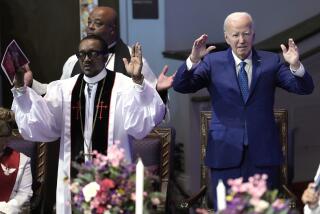Black Leaders Assail Criticism by Reagan
- Share via
WASHINGTON — Black leaders bristled Friday at a suggestion by President Reagan that their failure to credit his Administration for its accomplishments cost him black voters and that they think they will protect their jobs “if they can keep their constituency aggrieved.”
Reagan’s comments, in an interview published Friday by USA Today, were called “absolutely absurd” by Joseph Madison, political action director of the National Assn. for the Advancement of Colored People.
And the Rev. Joseph E. Lowery, president of the Southern Christian Leadership Conference, said the President “insults the intelligence of black people.”
Reagan said in the interview that some black leaders promote the idea that “we’ve relegated the black community to second-class status,” then added: “That’s not our intent, and that’s not our practice.”
A million unemployed black workers have found jobs since he took office in 1981, the President said. Blacks also have gained from reduced inflation, enhanced small business opportunities and improved access to higher education, he maintained.
When asked why black voters had opposed him by 9 to 1 in the November election, Reagan suggested that it was “maybe because they weren’t told very much by some of those leaders we’re talking about of what we’ve accomplished,” including the Administration’s fair housing amendments and its proposal to create “enterprise zones” to benefit central cities. Both plans stalled in the Democratic-controlled House last year.
But when asked whether he had considered talking with black leaders more representative of the black community than the black entrepreneurs with whom he conferred Tuesday, Reagan said he had “tried that at the very beginning” and rejected the approach.
SH’Don’t Want to Hear’
“I found out . . . that they are so committed politically to the opposite party that they don’t want to hear,” Reagan said. “And I have come to the conclusion that maybe some of those leaders are protecting some rather good positions that they have, and they can protect them better if they can keep their constituency aggrieved and believing that they have a legitimate complaint.
“If they ever become aware of the opportunities that are improving,” he added, “they might wonder whether they need some of those organizations.”
When told of Reagan’s comments, Madison said the President “acts like he hasn’t read the history of the civil rights movement over the last century.”
In the black community, the NAACP official said, “leadership is based on service to that community.” He suggested that “Reagan ought to read the Bible,” specifically the 20th chapter of Matthew, in which Christ told the apostles: “Whosoever will be chief among you, let him be your servant.”
Instead of launching a sophisticated effort to “destroy the existing leadership” of the black community, Madison said, Reagan should use his second term to “extend the hand of unity to that community” and thus “protect the future of the Republican Party.”
Lowery cited statistics showing that blacks remain economically disadvantaged, and he accused Reagan of “trying to blame the victims for the crime.” He said he and other leaders of the Black Leadership Forum--among them Benjamin L. Hooks, executive director of the NAACP, and Coretta Scott King, widow of civil rights leader Dr. Martin Luther King Jr.--had tried vainly to arrange a meeting with Reagan.
More to Read
Sign up for Essential California
The most important California stories and recommendations in your inbox every morning.
You may occasionally receive promotional content from the Los Angeles Times.










